I Feel Like I’m Going Insane Am I Overreacting or Should I Leave?
You’ve been with your partner for nearly ten years, have two young children together, and albeit the love is there, you’re feeling increasingly trapped, drained, and unsure of yourself. He’s had a short temper for a long time. Early on there was physical abuse — you were pushed during a drunken moment — and you drew a boundary then. You’ve felt safe since, physically, but the emotional side of the relationship keeps eroding you. Name‑calling (“dickhead,” “fat cow,” “idiot”), harsh demands (“shut your mouth”), yelling in front of your toddler, followed by apologies that all end with a “but”.
You’re wondering: Is this just normal relationship stress? Am I being overly sensitive? Should I stick it out because he’s a good dad and there for you? Or do these patterns signal something deeper — something you need to leave for your and your children’s sake?
Some parents forget the fact that their toddlers copy almost everything they do, even the bad things

The poster and her partner have been together for 10 years, and have 2 kids, but the man is emotionally violent towards her
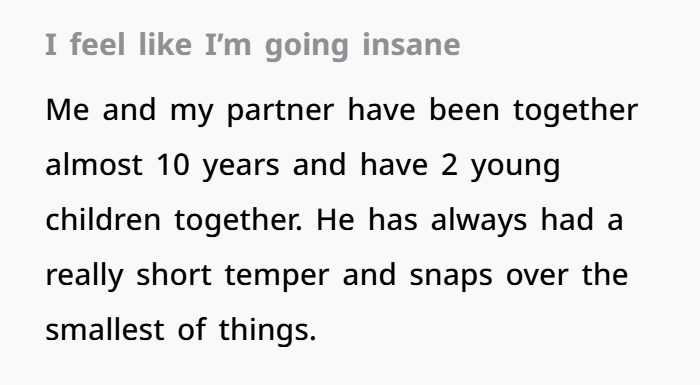
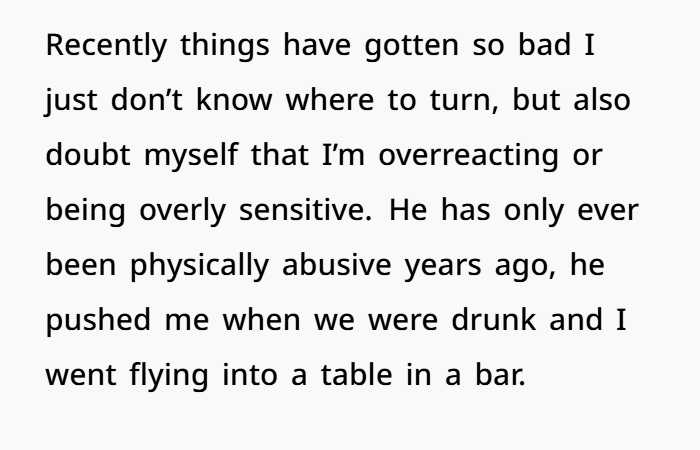
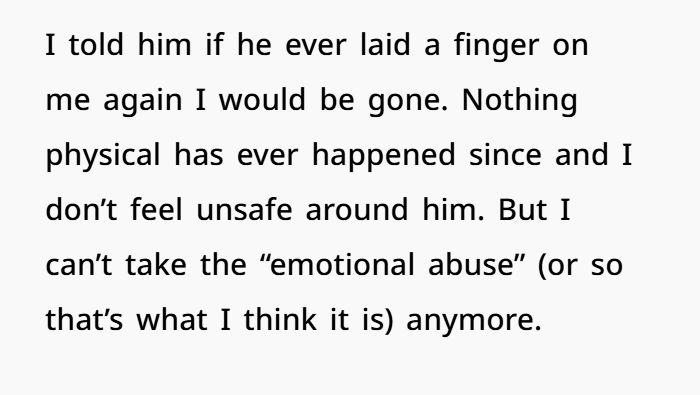
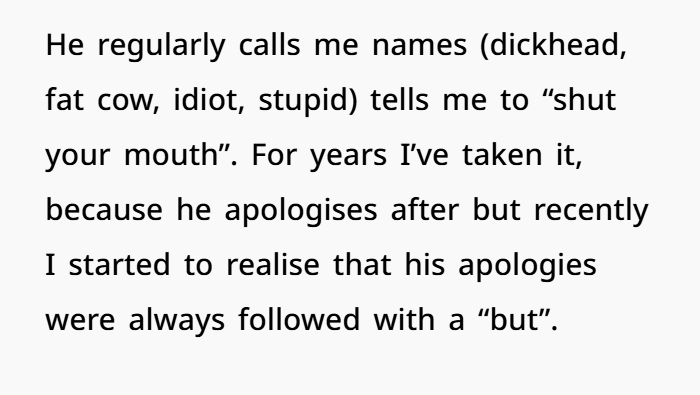
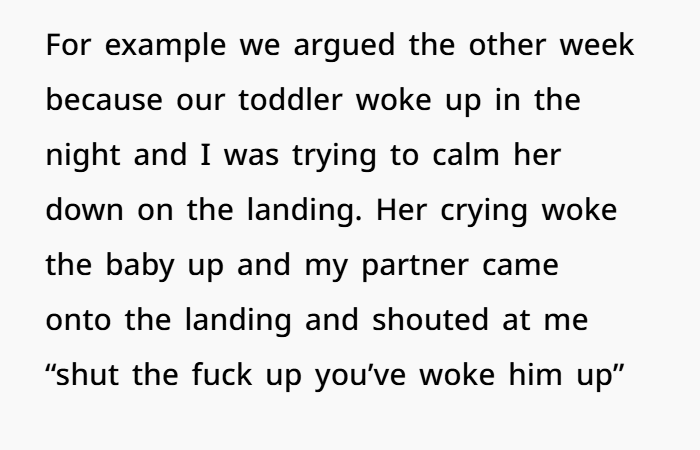
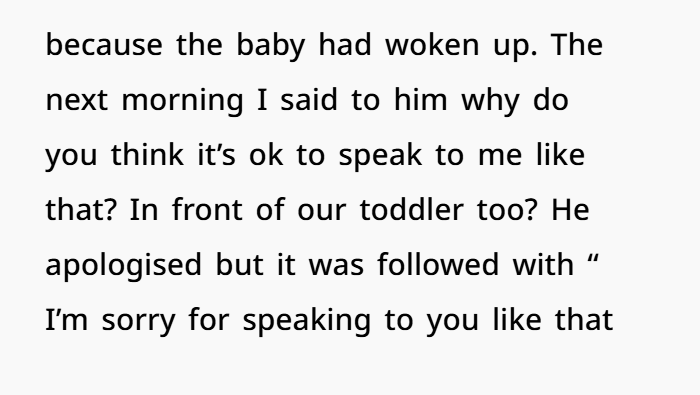
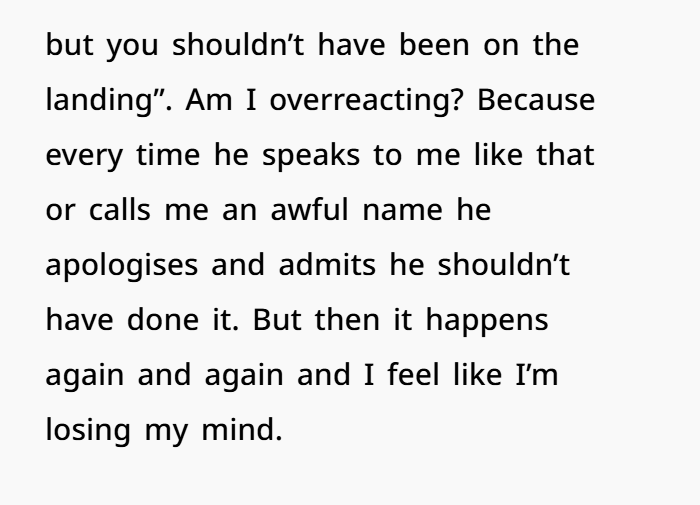
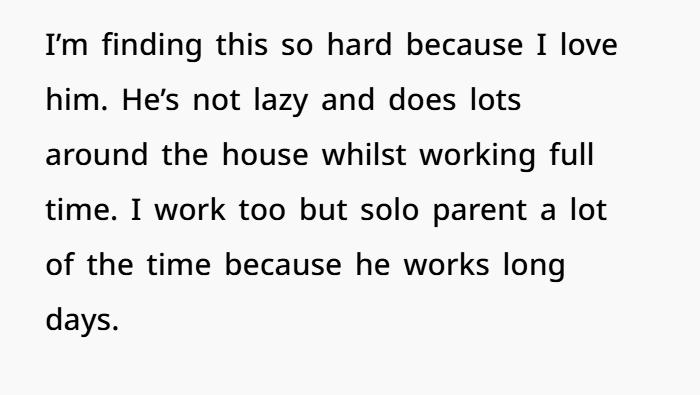
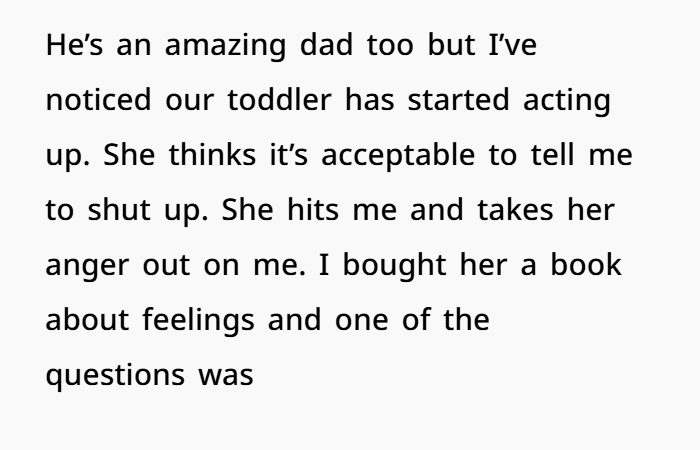
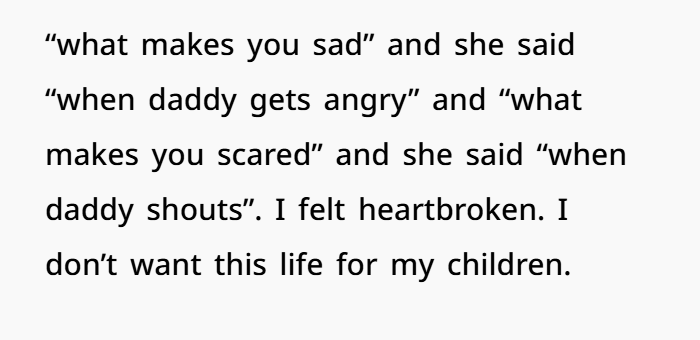
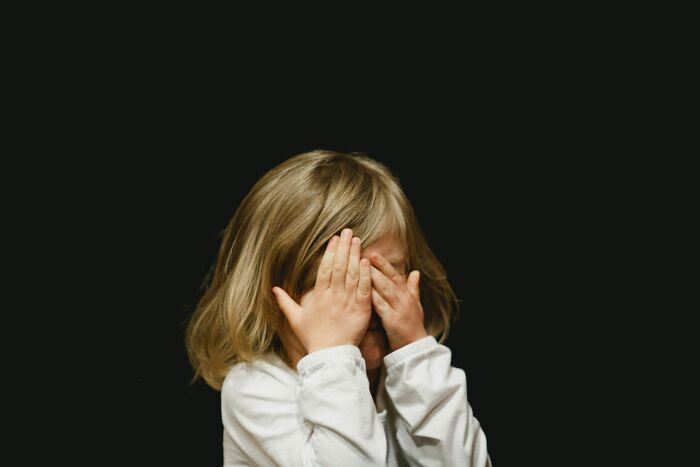
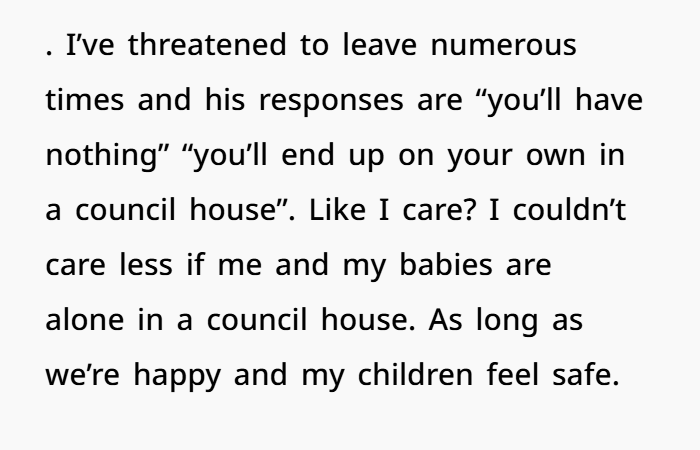
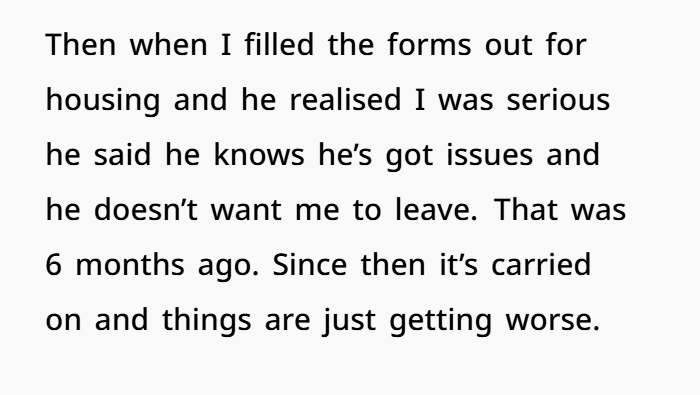
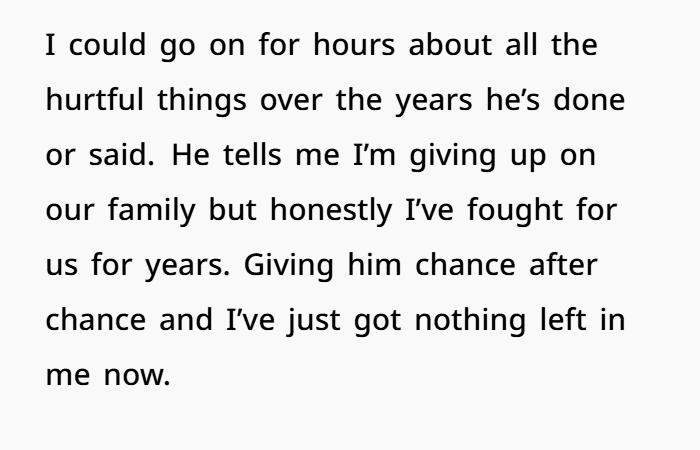
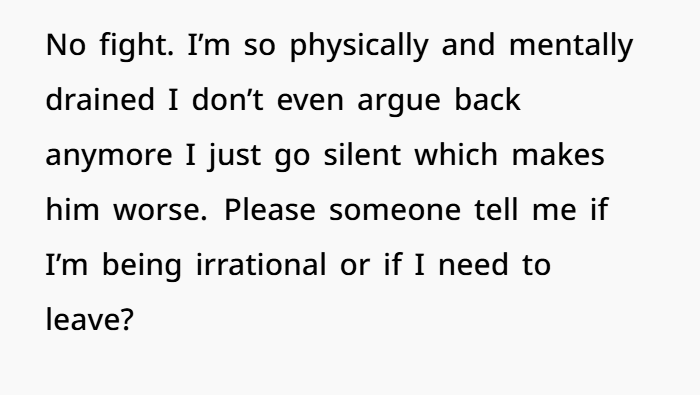
Recognising emotional abuse and control
What you describe strongly lines up with what experts call emotional or psychological abuse. It isn’t always about physical violence — words, tone, constant belittling, shouting, and blaming are all part of the abusive spectrum. For example:
- According to Canadian Women’s Foundation, emotional abuse is when someone uses words or actions to control, frighten or isolate someone, or to take away their self‑respect. Canadian Women’s Foundation
- Women’s Aid describe that even if you feel you are “wondering if I’m being silly”, a key red flag is if your behaviour has changed because of how your partner treats you. Women’s Aid
- Verywell Mind says emotional abuse is a consistent pattern of verbal attacks, manipulations, shaming, intimidation — and over time it wears down self‑worth. Verywell Mind
In your story:
- Being shouted at in front of your toddler, called names repeatedly — these are humiliation/derision.
- The “I’m sorry… but you shouldn’t have…” pattern: apology followed by blame shifting or justification.
- You’re doubting yourself and your feelings (“Am I overreacting?”) — self‑doubt is common in emotionally abusive dynamics.
- Your child telling you “when daddy shouts” she feels scared, sad — that shows the effects are lasting and visible.
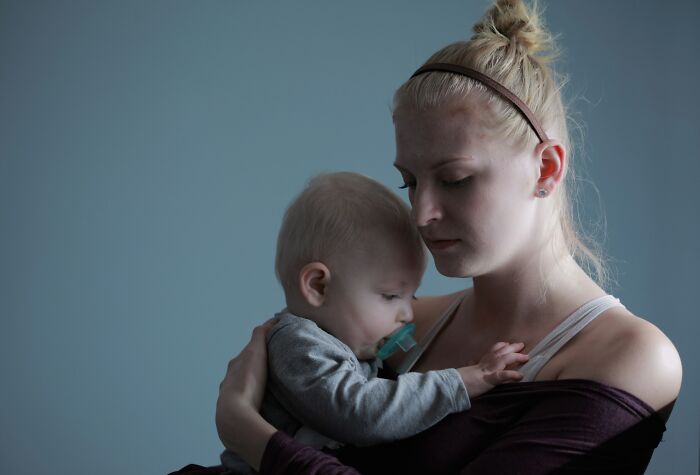
So, no, you’re not just being “too sensitive”. Your perceptions and feelings are valid. Abuse doesn’t need physical bruises to be real. WebMD+2Healthline+2
The context of love, good moments and confusion
It’s confusing because your partner also helps, provides, seems to love his kids, works hard. That can muddy the waters and create a trauma‑bond type of pattern: good moments followed by bad, forgiveness followed by repeat. The cycle keeps you in hope of “he’ll change”. Research on trauma/abuse shows that this kind of intermittent kindness + abuse strengthens emotional attachment and confusion. Wikipedia+1
Hence you feel “going insane” — your gut says something is wrong but you keep searching for justification, excuses, and staying because there is good there. That’s exactly how many people get stuck in abusive relationships.
What the children’s experience means
Your toddler telling you she’s scared when dad shouts — that matters. Children mirror what they see. When one parent behaves abusively (even if outwardly loving), the child absorbs it: that’s a modelling of what’s acceptable/normal. It already affects your child’s sense of safety, and already you’ve seen your toddler acting out (“shut up”, hitting) which could be a reflection of a chaotic emotional environment.
By staying in a pattern of yelling and name‑calling, the home becomes a place of tension and unpredictability. This builds stress for you and for the children. More than just discomfort — it’s a risk to emotional health of all of you.
So — should you leave? Or what are the options?
Leaving is a big decision, especially with children and shared history. But you don’t have to decide right away. What the research and experts suggest:
- Set boundaries: You have the right to say: “It is not okay to call me names, it is not okay to shout at me in front of the kids.” If those boundaries are crossed consistently, that is a sign something must change. Verywell Mind+1
- Get external support: Talk to a trusted friend, therapist, support line. When you’re in the cycle, you can’t always see the pattern clearly.
- Think of safety: Even though you say you don’t feel unsafe physically now, emotional abuse can escalate. It’s wise to plan for possibilities and understand what you’ll do if things worsen.
- Listen to your kids: Your daughter’s words are a big signal. You’re already noticing that things are “just getting worse.” That matters.
- Evaluate whether change is real and sustainable: Has your partner accepted responsibility without excuses (“but…”)? Is he actively working to change? Has the pattern improved? Many abusive relationships promise change and then default back to old ways.
If you decide you must leave: that is valid. You don’t owe a lifetime to someone who treats you this way. You and your kids deserve respect, safety, emotional stability.

Key keywords & concepts to keep in mind
Emotional abuse, verbal abuse, name‑calling, partner short temper, trauma bonding, power and control, boundary setting, children witnessing abuse, toxic relationship, adult children and abuse impact, leaving abusive relationship.
Some next steps you might consider
- Write down specific examples (dates, words) of when you felt degraded, scared, drained.
- Check the impact on you: Are you quieter, avoiding conflict, freezing, feeling worthless? These are signs of long‑term emotional abuse. Verywell Mind
- Have a calm conversation (if safe) with your partner: “When you call me names, I feel _____. I need ______ or I will ______.” Then follow through.
- Explore possible counselling (individual + maybe couple) only if he is genuinely committed and change is measurable. If not, the counselling alone can alert you that you need to walk away.
- Consider practical steps: Know your financial situation, housing possibility (you’re already doing that), support network, child care. Having a plan gives you power.
- Prioritise the children: They’re being affected. Your daughter has already spotted the behaviour. The home environment needs your protection.
Folks online assured her that emotional violence is just as bad as physical violence, and many advised her to ditch him as soon as possible
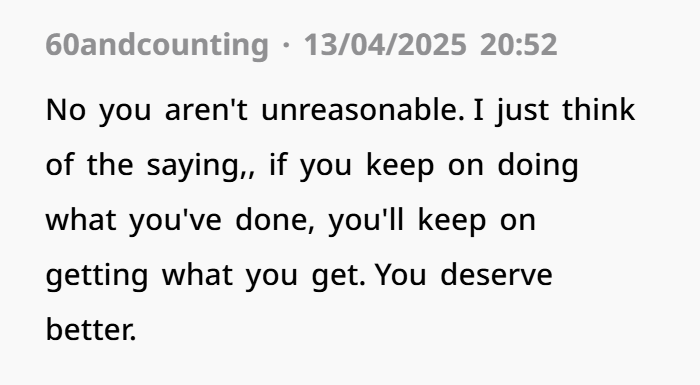
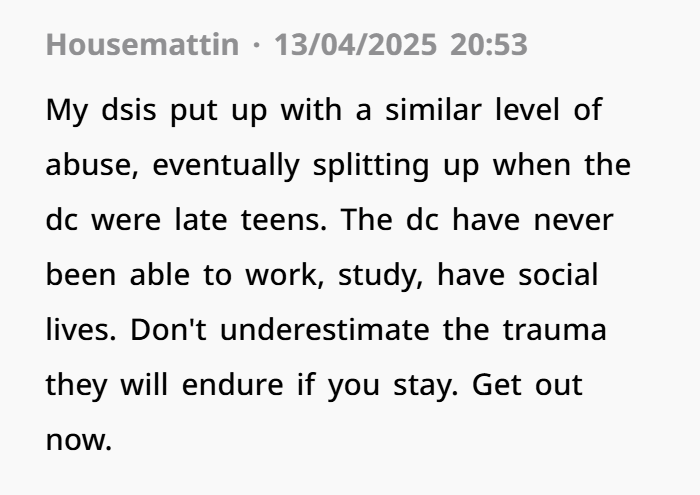
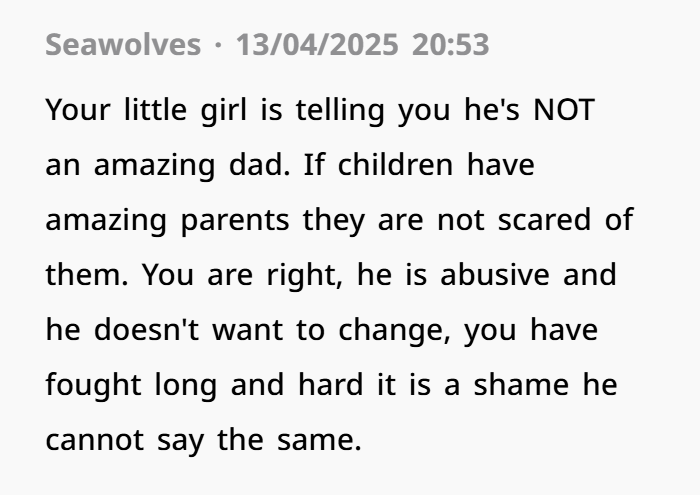

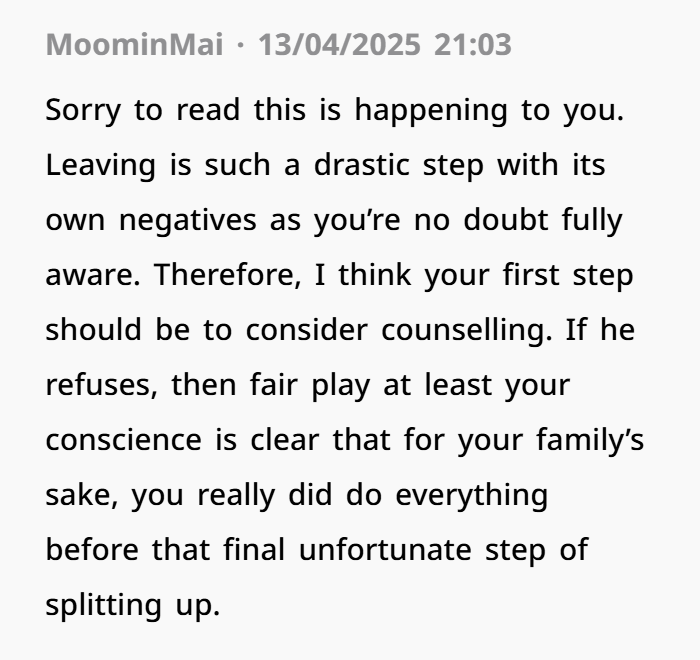
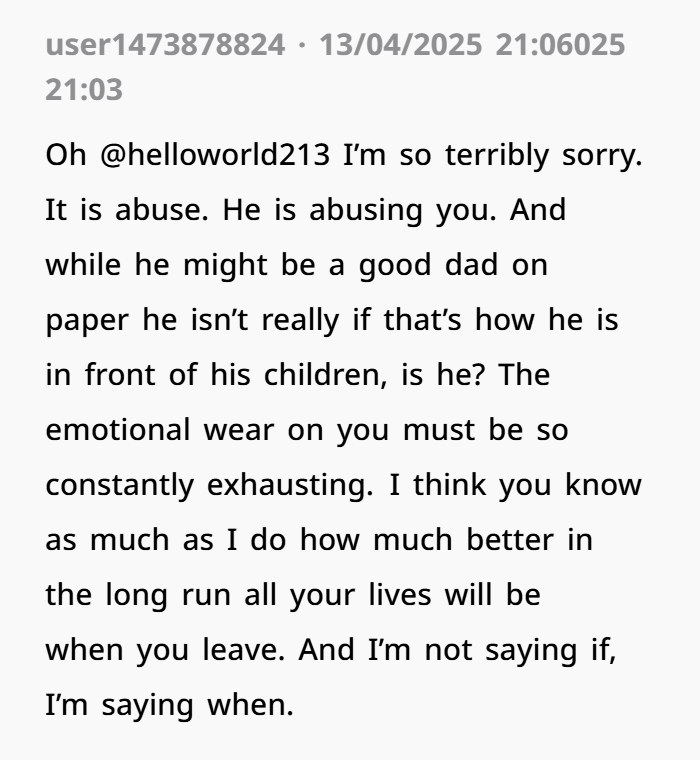
You are absolutely not crazy. The feelings you have, the self‑doubt, the confusion — they fit a pattern of emotional abuse. The question shouldn’t be “am I overreacting?” but rather “Is this how I want to live, and do I want this for my children?”
You’ve already done so much: you recognised you drew the line when it became physical, you reflected, you care deeply. Use that strength. You deserve kindness, respect and peace.

